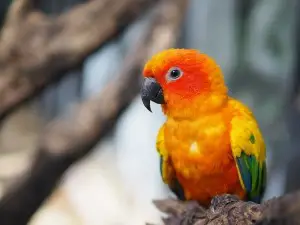
Regardless of what type of bird you have, a conure or other, vomiting can happen. But, just because it may happen, doesn’t mean that this is normal or ok.
This article is a look into why your conure may be vomiting clear liquid all of a sudden
Table of Contents
Conure vomiting clear liquid:
You likely love your pet conure very much and wouldn’t want the bird to get sick. But if your bird is vomiting then the bird may be sick.
This is what you need to know if your pet conure is vomiting clear liquid
It’s water:
If the clear liquid that your bird is vomiting looks like water then it may simply be water.
Conures can accidentally take in too much water and vomit it out later on. This can happen when your bird drinks water, while bathing, or showering.
Birds dip their beaks in water bodies and throw their heads back to get the water down their throat.
If the bird takes in too much water, too much for its mouth to hold, then some water may flow out of the bird’s beak when the bird puts its head upright.
Your conure may have also taken in too much water while showering or bathing.
What to do:
This does happen quite often and is not something that you should be worried about, you’d only need to start to worry if your bird starts to show signs of distress or shows signs of illness when it brings up the water.
If you see any signs of distress or illness when your bird brings up water then quickly take your bird to the vet.
Infectious laryngotracheitis:
If the clear liquid that your conure is vomiting has more of a mucous-like consistency, and not a water-like consistency, then the bird may have contracted a viral respiratory infection called infectious laryngotracheitis also called ILT.
This viral infection is caused by the herpes virus and is highly contagious.
There are a few ways that your conure may have contracted this virus, including coming into contact with an infected bird, and coming into contact with contaminated objects such as contaminated humans, contaminated housing, contaminated equipment, contaminated dead birds, contaminated animals, or contaminated dead bird tissue.
If you think that your bird contracted this ailment then check for other signs of this disease such as coughing up blood along with, or, in spite of coughing up mucous, wheezing, lethargy, watery eyes, sneezing, and watery discharge from the bird’s nares.
What to do:
Because this disease doesn’t have a specific treatment your bird will have to simply recover from this ailment on its own.
Quarantine the bird and give it its own food and water while in quarantine to keep other birds from becoming sick. Also, ensure that the bird is in an area with good ventilation while it is recovering.
That being said, this virus may weaken the bird’s immune system and cause the bird to become more susceptible to a secondary bacterial infection.
You may not know if your bird has a secondary bacterial infection without the help of a professional so taking the bird to the vet for a check-up is recommended.
The vet will physically examine the bird and also run tests on the bird to test its overall health. If it is found that your bird does have a secondary bacterial infection then the bird will be prescribed antibiotics
If you enjoyed this article then you may also be interested in other bird related articles. Here are some articles that you may be interested in: Cockatiel Vomiting Clear Liquid, Lovebird Vomiting Clear Liquid, Why Do Birds Fall Off Their Perch, Budgie Throwing Up Clear Liquid

